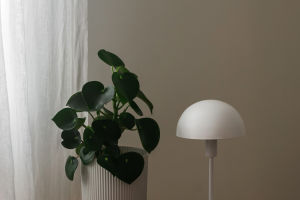Lykkers, have you ever felt instantly calmer just by looking at a plant? Whether it’s a leafy green on our desk or a flowering plant by the window, plants have a subtle but powerful way of affecting our mood and mental state.
Research shows that interacting with plants isn’t just aesthetically pleasing—it can actually improve our mental health. From reducing stress to boosting concentration and emotional well-being, plants offer more than beauty; they offer a kind of everyday therapy we can enjoy in our own homes.
Reduce Stress and Anxiety
Spending time around plants can lower stress hormone levels and help our minds relax. Simply watering, pruning, or observing a plant can redirect our attention from worries and deadlines to something calm and steady.
For those of us working long hours at computers or facing daily pressures, a small indoor plant can act like a mini mental reset. We can breathe, touch, and observe it, which naturally slows our heartbeat and eases tension. Even just sitting near greenery for a few minutes a day can create a noticeable sense of calm.
Boost Mood and Emotional Balance
Plants don’t just reduce stress—they also lift our spirits. Watching new leaves sprout or flowers bloom brings small but meaningful moments of joy. Caring for plants can also create a sense of accomplishment and purpose, which is essential for emotional health.
For example, setting aside a few minutes each day to tend to our indoor garden or balcony plants encourages positive routines. These simple actions—checking soil moisture, trimming leaves, noticing growth—remind us that we can nurture life and, in turn, nurture ourselves.
Improve Focus and Cognitive Function
When we engage with plants, our attention naturally narrows to the task at hand. Observing the patterns of leaves, watering carefully, or trimming branches requires focus and mindfulness.
This active concentration promotes what psychologists call a “flow state,” where we become fully immersed and lose track of time. Regularly practicing this kind of focused attention can improve our overall productivity and mental clarity in daily life.
Foster Connection and Mindfulness
Caring for plants encourages us to slow down and connect with the present moment. As we touch soil, inhale plant scents, or listen to the gentle rustle of leaves, we become more mindful of our senses and surroundings.
This connection isn’t just with the plant—it’s also a connection with ourselves. Taking a moment to notice the little changes in our plant’s growth helps us appreciate life’s subtleties and promotes emotional resilience.
Practical Tips to Boost Mental Health with Plants
To make the most of plants for our mental health, we can combine them with small daily habits:
- Start small: One low-maintenance plant on a desk is enough to begin feeling benefits.
- Create a routine: Water, prune, or check on your plants at consistent times each day to build mindfulness.
- Use multi-sensory experiences: Notice smells, textures, colors, and even taste if you grow herbs or edible plants.
- Combine with other activities: Enjoy a cup of tea while observing plants, read a book in your garden corner, or practice light stretching surrounded by greenery.
These small practices help integrate plants into our daily lives, turning them into active partners in supporting our mental well-being.
Grow Your Mind
Lykkers, plants are more than decoration—they are mental health allies. They reduce stress, improve focus, lift mood, and create a quiet space for reflection. By incorporating even a few plants into our homes or workspaces, we can cultivate a calmer, more balanced mind.
Let’s take a few minutes today to nurture a plant and, in turn, nurture our own mental health. Together, we can let our minds bloom as beautifully as our plants.


